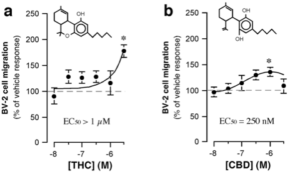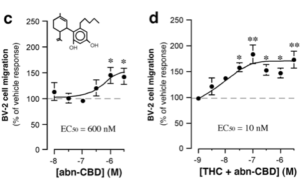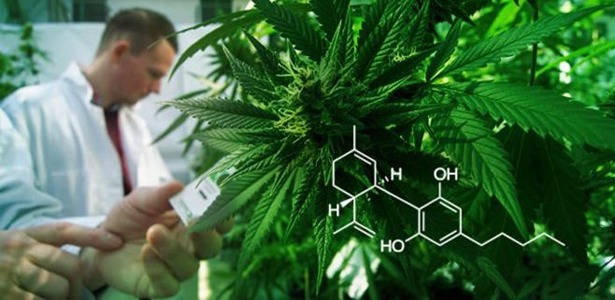By: Jennifer Corso, BA, MA
Biochemical Physiologist, Darwin Brands
Our nation is struggling to treat lifestyle constructs that foster chronic disease, an opioid crisis, and an obesity epidemic. Further, according to the National Institute of Mental Health (NIMH), 6.7% of U.S. adults have suffered from a major depressive episode at least once in their life, with another 19.1% suffered from anxiety in the past year. That’s more than 45 million people at any given time. Why a population with access to advanced medical research and technology is scrambling to maintain its own well-being is a lengthy discussion ripe with conflict between science, time and fiscal interest.
Luckily, fueled by the end of a prohibition on hemp and a legal acceptance of medical marijuana by many states, CBD is being embraced by an ever-rising populus for its ability to do good within the body. Some are going so far to consider it a historically-proven panacea. The following questions therefore arise: How does CBD actually elicit the sought-after mental and physical changes, and what does it actually do?

Of the research that exists, many studies are underpowered, lack good control of variables, and have yet to provide substantial evidence of efficacy, despite the mounting evidence of its widespread, therapeutic promise. CBD is often referred to as a non-psychoactive or non-psychotropic constituent of both cannabis and hemp, a technical misrepresentation of this commonly discussed (and more socially acceptable) cannabinoid.
At this point, it is clear there’s much more to CBD’s interaction within human physiology than we understand. The compound has been praised by many for its anti-inflammatory properties, potentially leading to pain relief and assisting in amelioration of some disorders. As an immuno-regulator, it’s thought that CBD has an effect on the production and action of various cytokines responsible for regulating inflammation. According to several studies, CBD may increase the activity of interleukin-10 (IL-10) and regulate the pro-inflammatory effects of IL-6, both glycoproteins responsible for regulating inflammation. Though more investigation is warranted, the compound may be useful in treating pain and both Type II diabetes.
But, as for the question of CBD’s psychoactivity, by definition, any substance that elicits a change in psychological state or mood can be classified as pharmacologically psychoactive. This is not to be confused with intoxication, a term synonymous with being high, such as after consuming tetrahydrocannabinol (THC).
CBD is popularly utilized by individuals to treat non-clinical depression and/or anxiety, both classified by the medical community as mood disorders. A 2010 study published in BJP supports the notion of CBD as an antidepressant based on its 5-HT1a agonistic properties. The 5-HT1a receptor is a G-coupled protein receptor that binds the mood-regulating neurotransmitter serotonin. CBD’s action on the 5-HT receptor family may also support its use as a panicolytic drug.
An example of CBD’s “psycho-activity” is illustrated by the 2018 FDA approval of Epidiolex, a cannabis-derived CBD drug for use in the treatment of Lennox-Gastaut and Dravet syndromes, two serious forms of epilepsy. Its mode of action as an anti-epileptiform and anticonvulsant is thought to be due to a combination of cumulative effects on inflammation, serotonin receptors and the ability to modulate GABA channels, however a solid scientific consensus has not been reached.

CBD has also been shown to assist in the prevention and counteract several adverse effects of THC intoxication, such as anxiety and memory loss. According to a 2013 article published in Frontiers in Psychiatry, CBD may inhibit these unwanted effects by preventing the reuptake of anandamide, a competitive, endogenous cannabinoid that has a stronger affinity for CB1 receptors than THC. It’s ability to decrease intracellular calcium concentration by way of T-type calcium channel inhibition may also help prevent the neurotoxic effects of high or prolonged use of THC. This mechanism may also play a role in CBD’s anticonvulsant properties.
Adverse effects of CBD use in adults are inconclusive, and dose-response curves for many of the conditions mentioned here do not exist. (As with anything consumed, “the dose makes the poison.”) According to several studies using both in vitro animal models and human cell lines, it has been suggested that CBD exposure may lead to inhibition of IL-2 and IL-8 synthesis, cytokines that regulate T-cell, and neutrophil and B-cell activity, respectively. Downregulation of these glycoproteins may lead to immunosuppression. In opposition, regulation of neutrophils and other inflammatory markers by CBD may decrease the risk of ischemia-reperfusion injury according to a study published in AJP’s Heart and Circulatory Physiology. Other adverse effects include diarrhea and decreased appetite.
The understanding of CBD’s psychological and physiological activity within the human body has progressed far beyond this publication. It is being investigated to treat psychosis in Parkinson’s disease, and according to a study being conducted at the University of Miami, may promote recovery in individuals who have suffered from sustained concussion and traumatic brain injury (TBI). Regardless of personal perspective, there does exist a small but growing database of respectable scientific research on its therapeutic potential, and it can only grow from here.
We will discuss CBD further, and many other fascinating scientific developments in cannabis as this column continues. Learn more next month–

A US Army veteran, Jenny Corso is the Lead Scientist for Darwin Brands. She holds a Masters’ degree in Kinesiology (Exercise Physiology) with a secondary concentration in Biochemistry. She taught at both California State University Chico and Arizona State University, and presented her research at conferences for American Heart Association Scientific Sessions, the US Cannabis Conference 2018 and the American College of Sports Medicine. She also hosts the science lectures for Women Grow Phoenix.
Sources:
https://www.gwpharm.com/healthcare-professionals/research/mechanism-action#
https://www.nimh.nih.gov/health/statistics/major-depression.shtml
https://www.nimh.nih.gov/health/statistics/any-anxiety-disorder.shtml
https://www.ncbi.nlm.nih.gov/pmc/articles/PMC2748879/pdf/nihms131165.pdf
https://www.frontiersin.org/articles/10.3389/fpsyt.2013.00130/full#B17
https://bpspubs.onlinelibrary.wiley.com/doi/full/10.1111/j.1476-5381.2009.00521.x
https://www.sciencedirect.com/science/article/pii/S0166432810003438
https://journals.sagepub.com/doi/abs/10.1177/0269881110379283
https://www.physiology.org/doi/full/10.1152/ajpheart.00098.2007


